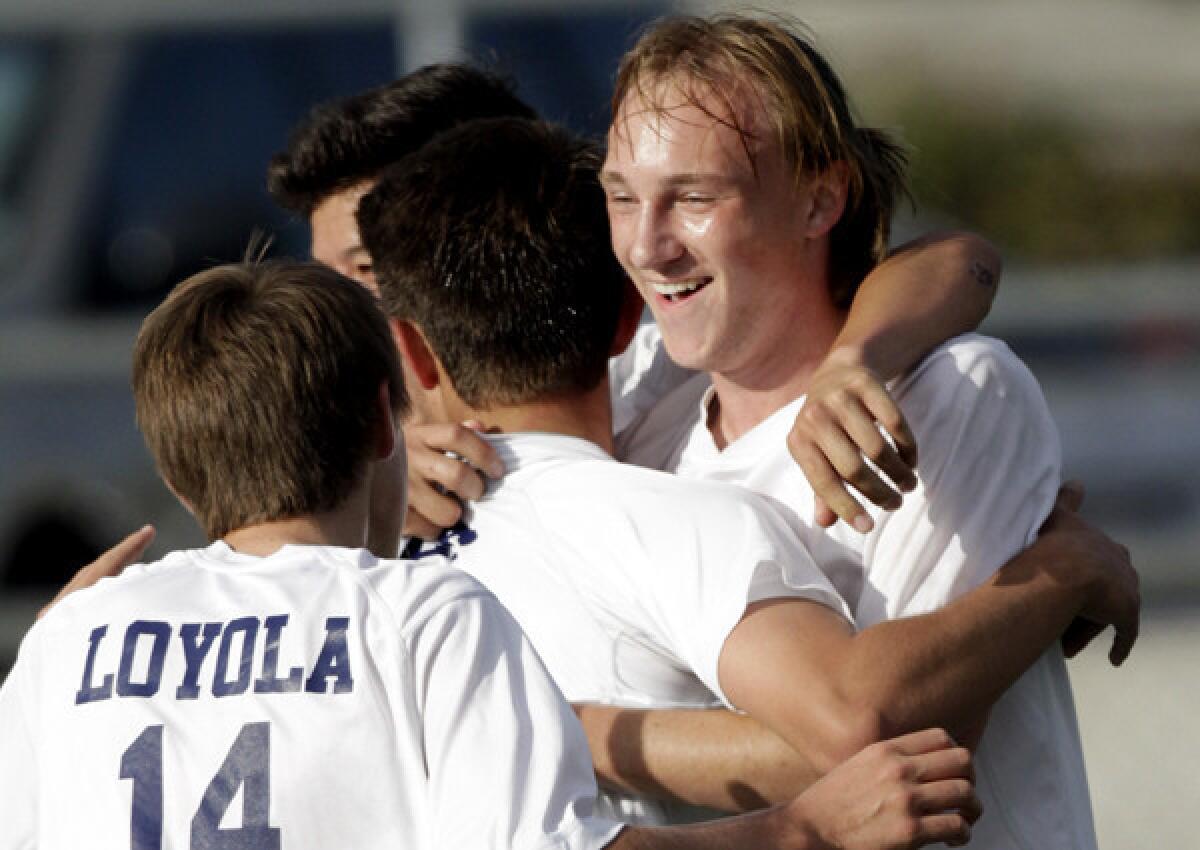Despite rise of soccer academies, high schools have some top talent

- Share via
The Southern Section and City Section soccer championships are scheduled for next weekend, and all the top boys’ players participating ought to receive a big thank you from their classmates for deciding to represent their schools instead of joining the U.S. Soccer Academy League.
It has been several years since U.S. Soccer decided it needed to copy the European model if it wanted to win a World Cup, so it created a year-round training program for top high school players. Because high school soccer is played in the winter in California, players are forced to make a choice: academy or high school.
That means some 200 Southern California students didn’t play for their high school teams this season. They believe they receive greater exposure to college recruiters and better training from club coaches. It’s their choice, so I wish them good luck.
They’re missing out on some amazing experiences, though. There are quality high school programs that train six days a week and help develop players. College recruiters looking for good players still come to see top high school games. And who wouldn’t enjoy being recognized around campus as a CIF champion while participating in an unforgettable journey with his best friends?
“The system is not perfect,” Anaheim Servite Coach Jon Spencer said.
Spencer, who has one of the top programs in Southern Section Division 1, lost a player he had helped earn a spot on an academy team. The original understanding, according to Spencer, was the player would also be allowed to play high school soccer. It’s just another example of the continuing conflict.
“U.S. Soccer shouldn’t force kids to choose between playing for their school and playing for their club,” Lake Balboa Birmingham Coach E.B. Madha said. “I think it goes against the entire American way of life, where kids play for their high school, then their college, then the pros.”
Spencer said the academy program “is good because it’s helping increase the standards on the club soccer level, but it doesn’t solve the issue of helping us to win a World Cup.”
Spencer said key parts are missing from the academy system: “There is no academic component. There is no social component. We’re not developing young people to be leaders.”
Fortunately, lots of good players are finding they can still achieve some of their dreams playing high school soccer.
Get a good glimpse of senior Ryan Savitt walking around the Los Angeles Loyola campus, because in 10 years you might need binoculars to spot him flying a jet off an aircraft carrier.
“I know it’s daunting, ‘Oh, you’re trying to land on something that’s moving,’” he said.
Savitt is headed to Navy. He’s ready for, “Yes sir, no sir” and early morning reveille.
“I’ve developed this intrigue for aerospace engineering,” he said.
With a 4.35 grade-point average, Savitt has the brain power to succeed. And soccer has helped train him and prepare him for future challenges.
He’s been one of the key defenders on the back line for top-seeded Loyola, which defeated Santa Margarita on Thursday to advance to a semifinal in the Southern Section Division 1 playoffs. He moved here from Milwaukee as a junior and was involved with an academy program before deciding to stick with high school soccer.
“I decided playing high school for my school was the best opportunity for me,” he said.
The Cubs will play Servite in a semifinal on Tuesday.
Loyola Coach Chris Walter said he has four students who aren’t playing this season because they are with academy teams.
Last season, in a semifinal playoff game between Servite and Loyola, there were close to a dozen college coaches in attendance. That’s pretty good exposure for a little high school match.
Savitt said, “Soccer has always been important in my life. It’s driven my life. It’s gotten me places where I never asked to go before.”
If only the soccer constituencies could work together, life would be so much easier and possibly better.
More to Read
Go beyond the scoreboard
Get the latest on L.A.'s teams in the daily Sports Report newsletter.
You may occasionally receive promotional content from the Los Angeles Times.











